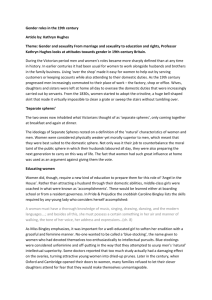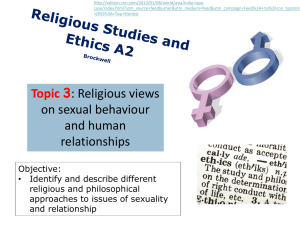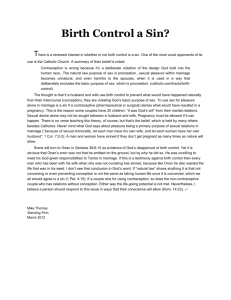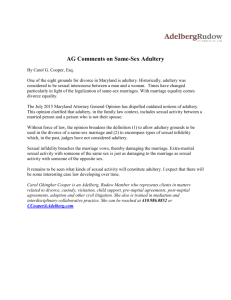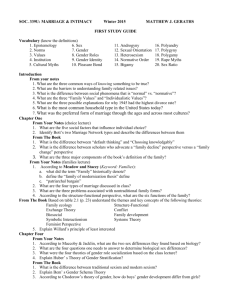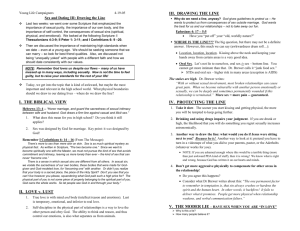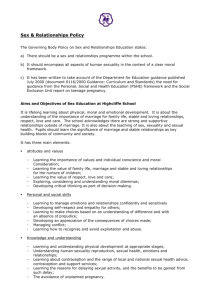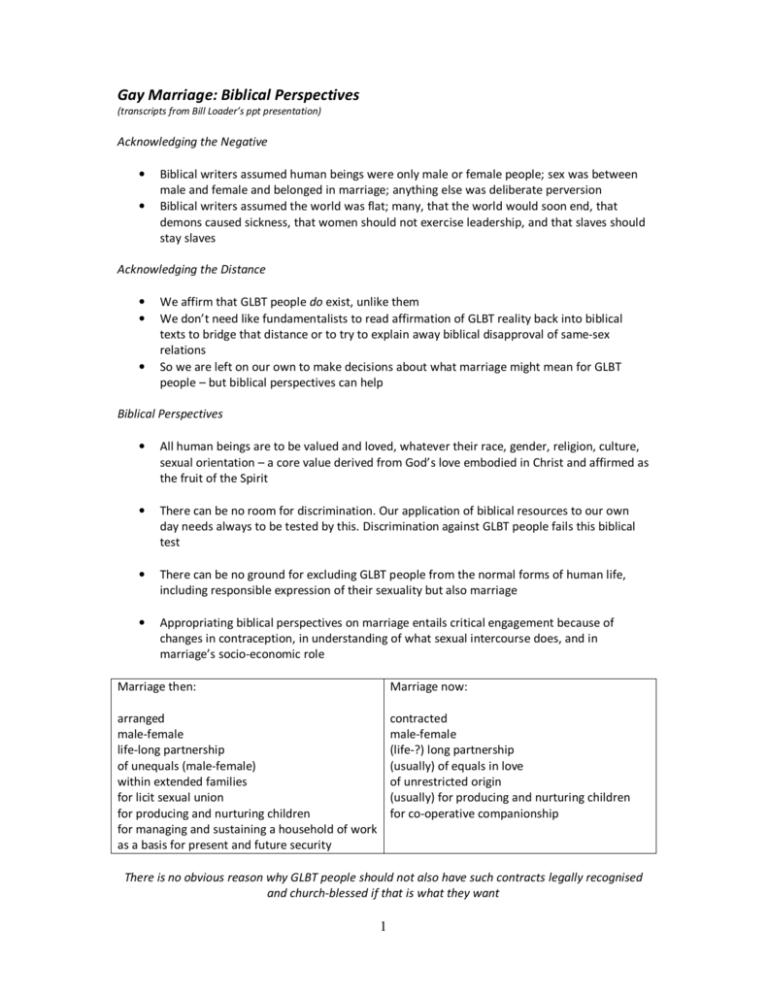
Gay Marriage: Biblical Perspectives
(transcripts from Bill Loader’s ppt presentation)
Acknowledging the Negative
•
•
Biblical writers assumed human beings were only male or female people; sex was between
male and female and belonged in marriage; anything else was deliberate perversion
Biblical writers assumed the world was flat; many, that the world would soon end, that
demons caused sickness, that women should not exercise leadership, and that slaves should
stay slaves
Acknowledging the Distance
•
•
•
We affirm that GLBT people do exist, unlike them
We don’t need like fundamentalists to read affirmation of GLBT reality back into biblical
texts to bridge that distance or to try to explain away biblical disapproval of same-sex
relations
So we are left on our own to make decisions about what marriage might mean for GLBT
people – but biblical perspectives can help
Biblical Perspectives
•
All human beings are to be valued and loved, whatever their race, gender, religion, culture,
sexual orientation – a core value derived from God’s love embodied in Christ and affirmed as
the fruit of the Spirit
•
There can be no room for discrimination. Our application of biblical resources to our own
day needs always to be tested by this. Discrimination against GLBT people fails this biblical
test
•
There can be no ground for excluding GLBT people from the normal forms of human life,
including responsible expression of their sexuality but also marriage
•
Appropriating biblical perspectives on marriage entails critical engagement because of
changes in contraception, in understanding of what sexual intercourse does, and in
marriage’s socio-economic role
Marriage then:
Marriage now:
arranged
male-female
life-long partnership
of unequals (male-female)
within extended families
for licit sexual union
for producing and nurturing children
for managing and sustaining a household of work
as a basis for present and future security
contracted
male-female
(life-?) long partnership
(usually) of equals in love
of unrestricted origin
(usually) for producing and nurturing children
for co-operative companionship
There is no obvious reason why GLBT people should not also have such contracts legally recognised
and church-blessed if that is what they want
1
Other Issues of Sex and Marriage
Marriage as Alliance
Political alliances through marriage
Social alliances
• To form a household within the extended family
• To ensure family land and resources - essential for security/welfare
• To ensure offspring for family/household
• To ensure working partnership - domestic management
Marriages were arranged: 30 yr old with 15-20 yr old woman
Virginity mattered (pregnancy)
Adultery forbidden as threat
Same-Sex
In the Greco-Roman world sexual responses range from sex with women to sex with other
men or boys – no categories “heterosexual x homosexual”
• There was some belief that some men might naturally have a sexual orientation to males –
the myth of Aristophanes; but nothing like our modern understanding of “homosexual”
• Most references to same-sex intercourse are about men who also engage in sex illicitly with
women
• Many are about sex with boys in puberty – classical aristocratic Greece could include sexual
intimacy in educational mentoring, later pederasty with boys or slave boys or male
prostitutes
Greco-Roman objections to male-male sexual intercourse:
• One man was passive and so acted as a female – a matter of shame to act as female and to
make someone do so (“it doesn’t it matter if they are inferior anyway” – so Roman law only
against it with citizens: slaves, prostitutes, and foreigners are OK)
• It threatens to undermine nature’s (sole?) purpose for sex: having children, so is unnatural.
Population might die out. Semen might run out (also why v. masturbation and not too much
sex of any kind) men might lose their vigour
• It happens where sexual desire is excessive and out of control – moderation is the model –
all passion is “dangerous”, even in marriage
• It was exploitative of the young
Jewish objections:
• Leviticus 18:22; 20:13
• assumptions based on Genesis about male and female
•
Love and Marriage
Creation – Genesis 1
• God created male and female
• Jews assumed all people were heterosexual
• “be fruitful and multiply” –sex for having babies, but more …
Creation – Genesis 2
• Sex for intimacy/companionship: myth of making female from male for intimacy, “that they
might be one” – including sexual intimacy – something positive, belonging in marriage
reflecting household values
2
•
Jesus affirms creation: male and female and two becoming one flesh (including sexual union
as positive – and no mention here of having children as the only legitimate basis for sex)
Sex and Danger
•
•
•
•
I say to you that everyone who looks at a woman (woman/wife; i.e. some other man’s wife)
with lust (desire/covet/wanting to have her) has already committed adultery with her in his
heart (Matt 5:28)
Not: whoever looks at any woman and has a sexual response – which would make sexual
response evil and make women dangerous and therefore needing to be controlled – though
it came to be understood that way later
Male-focused: men need to take responsibility for what they do with their sexual responses
(and not blame women) – also OK to welcome women among disciples
“Pluck it out … cut it off!” (Matt 5:29) Take sexual wrongdoing and response seriously!
Love and Passion
Herod as a victim of excessive passion
• Some among Greek philosophers taught suppression of passion, including sexual passion.
Sex only for procreation.
• Avoid uncontrollability of strong passion of any kind.
• Biblical affirmation of sexual desire as part of creation but taking responsibility
The Magic of Sex and Purity
“Therefore a man leaves his father and his mother and clings to his wife, and they become one
flesh.” (Gen 2:24)
• Sexual union makes a permanent bond.
• Similarly Paul says becoming one flesh with a prostitute breaks existing bonds.
• No return of a woman who has slept with another man (including after divorce and
marriage)
Sex and Slaves
Male head and husband marries when ready to establish own household around 30 (time Jesus
chose not to) to his wife in teens
Controls all in household
Greco-Roman world:
• sexual access to all women and men he controls
• sex with slaves, female and male; except incest
• and beyond the household: with prostitutes
• sexual experience with prostitutes from puberty onwards
Jewish world:
• sexual access to all women he controls – sex with female slaves – prostitutes came to be
forbidden
Christians?
3
Household Head: Sexual Limits
Male head and husband – limits
• No sex nor marriage with close family members: sister, step sister, mother, father’s other
wife, daughter, daughter-in-law, sister-in-law (John the Baptist criticised Antipas for
marrying divorced wife of step brother), aunt – but OK with niece, cousin – Jewish law.
Greco-Roman law also had limits on incest
• No sex with women under control of another male – his wife (adultery), slave, etc. Adultery
is an act of theft against another male. (You shall not covet neighbour’s wife, ox, etc). Only
with independent women (prostitutes) or non-citizens in Greco-Roman world.
Divorce
Male head and husband
• Negotiates and decides marriage
• Controls daughters
• Divorces
in Jewish world – only the man, though women could initiate divorce
In Greco-Roman world: both could, but normally the man
• Divorce becomes more of a problem once Greco-Roman influence and economics bring Jews
to abandon polygyny; in polygyny: dissatisfied with one wife; take another!
• Jesus prohibited divorce – rationale: permanent join, but probably assumed adultery
permanently severed, as Paul, and so adultery required divorce.
Male Female Sex Roles
• A superior “used” an inferior for sex (“use” = sexual intercourse)
• Male is active – female is passive
• Male is on top – women are underneath
“Women are not as interested in sex as men” (Philo)
Some Useful Literature
Brooten, Bernadette J. Love Between Women: Early Christian Responses to Female Homoeroticism
(Chicago: University of Chicago Press, 1998)
Collins, Raymond F. Sexual Ethics and the New Testament: Behavior and Belief (New York: Crossroad,
2000)
Countryman, L. William. Dirt, Greed, and Sex: Sexual Ethics in the New Testament and Their
Implications for Today (2d ed.; Minneapolis: Fortress, 2007)
Hanks, Thomas. “Romans,” in The Queer Bible Commentary (ed. Deryn Guest, Robert E. Goss, Mona
West, and Thomas Bohache; London: SCM, 2006) 582-605
Loader, William. Sexuality and the Jesus Tradition (Grand Rapids: Eerdmans, 2005)
Loader, William. Sexuality in the New Testament: Understanding the Key Texts (London: SPCK;
Louisville: Westminster John Knox, 2010)
Loader, William. The New Testament on Sexuality (Grand Rapids: Eerdmans, 2012)
Loader, William – website papers: http://wwwstaff.murdoch.edu.au/~loader/
Martin, Dale B. Sex and the Single Savior: Gender and Sexuality in Biblical Interpretation (Louisville:
Westminster John Knox, 2006)
Via, Dan O. and Robert A. J. Gagnon, Homosexuality and the Bible: Two Views (Minneapolis: Fortress,
2003)
prepared by Emeritus Professor William Loader FAHA, June 2011
See now also “Understanding the Gay Marriage Debate” and Same-Sex Relationships: A First
Century Perspective
4

